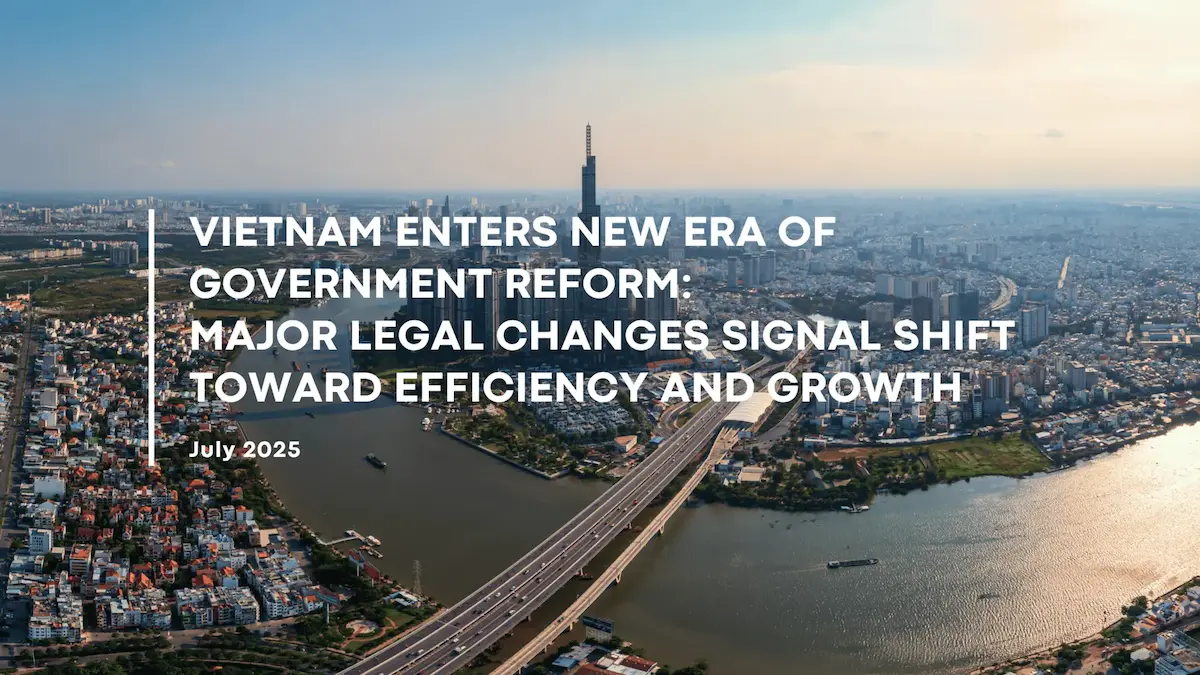Vietnam is undergoing its most comprehensive government reform since the Đổi Mới (Renovation) period of the 1980s. As of 1 July 2025, a sweeping two-tier administrative system officially took effect, along with reducing the number of provincial-level units from 63 to 34. This marks a structural overhaul aimed at building a more efficient, transparent, and investment-friendly government.
As detailed in our previous coverage on Vietnam’s governmental restructuring, this transition brings with it wide-reaching legislative and strategic shifts. These reforms are expected to unlock substantial policy momentum, with a historically high volume of new laws and regulations anticipated in the near future. Among the most significant legal developments as at June 2025 was the amended Law on Enterprises and the National Assembly’s resolution to establish international financial centres in Ho Chi Minh City and Da Nang – both key indicators of Vietnam’s ambition to position itself as a competitive regional hub.
1. Major Amendments to the Law on Enterprises: Enhancing Transparency and Accountability
As part of Vietnam’s broader institutional reform, the Law on Enterprises No. 59/2020/QH14 (“2020 Law on Enterprises”), the primary legislation governing the establishment and operation of businesses in Vietnam, was amended to introduce several critical changes aimed at strengthening business transparency, investor protection, and regulatory oversight. The most notable amendments, which came into effect from 1 July 2025 include:
(i) introduction of the concept of an Ultimate Beneficial Owner (“UBO”); and
(ii) enhanced disclosure and valuation requirements for share capital and capital contributions.
i. Introduction of the UBO Concept
For the first time, the concept of an UBO has been formally incorporated into the Law on Enterprises, which was previously addressed under Vietnam’s anti-money laundering laws. This amendment marks a significant step toward aligning Vietnam’s corporate governance framework with international standards, particularly those set by the Financial Action Task Force, which has placed Vietnam on its grey list and may consider escalation if progress stalls.
A UBO is defined as any individual who effectively holds ownership of the charter capital or has controlling influence over the enterprise, with the exception of state-appointed representatives in state-owned enterprises. An individual is considered a UBO if the said individual:
- Directly or indirectly owns at least 25% of the charter capital or 25% of the total voting shares of the enterprise. Indirect ownership is defined as an individual meeting the 25% threshold through another legal entity; or
- Exercises controlling power over the enterprise’s decision-making, including the ability to appoint or remove a majority or all of the members of the board of directors or members’ council, legal representatives, or general directors. Controlling power also extends to decisions on amending the company charter, altering the corporate governance structure, or reorganising or dissolving the company.
Additionally, the amended Law on Enterprises imposes new compliance obligations regarding the declaration of UBO for both new and existing enterprises. Enterprises established on or after 1 July 2025 are now required to declare their UBO(s) at the time of business registration. For enterprises incorporated before this date, UBO information must be submitted the next time they notify the authorities of any changes to their business registration. Alternatively, these businesses may choose to declare their UBOs voluntarily at any time.
The required declaration must include the UBO’s personal identification details and a description of the nature of their control or ownership over the enterprise. In addition, businesses must retain this information at their registered head office and are obligated to promptly notify the relevant authorities of any changes to the UBO details.
ii. Strengthened Oversight of Share Capital and Capital Contributions
The amended Law on Enterprises also introduces enhanced requirements regarding capital transparency, particularly in the valuation of shares and capital contributions. One of the core changes is an updated definition of “market value of capital contribution or shares” as follows:
- For listed shares or shares registered for trading on the securities exchange, market value means the average trading price over the 30 consecutive days preceding the valuation date, or alternatively, a mutually agreed price between buyer and seller, or a valuation provided by a licensed appraisal organisation.
- For unlisted capital contributions or shares, market value refers to the most recent market transaction price, a negotiated price between the parties, or a value determined by a licensed appraisal organisation.
While the amended law still does not mandate arm’s length valuation – meaning parties are not required to engage independent third parties in every case – it takes a firmer stance on accountability. In particular, the Law on Enterprises now explicitly prohibits the mispricing of noncash contributions in charter capital.
This update is designed to address longstanding issues around the inflation of non-cash capital contributions – such as assets, land use rights, or intellectual property – where inflated or unverifiable valuations have historically been used to obscure true ownership ratios or inflate charter capital on paper. Such practices have not only undermined financial transparency but have also created risks for shareholders and business partners, especially in disputes.
2. National Assembly Approves Resolution to Establish International Financial Centre
In a landmark move underscoring Vietnam’s ambition to elevate its role in the global financial system, the National Assembly passed a resolution on 27 June 2025 approving the establishment of an international financial centre (“IFC”) with two locations to be placed in Ho Chi Minh City (HCMC) and Da Nang City. This initiative forms a strategic pillar of the government’s broader reform agenda, aimed at positioning Vietnam as a competitive regional financial hub capable of attracting global capital, technology, and expertise.
Finance Minister Nguyen Van Thang emphasised that the IFC will be developed in accordance with international standards of transparency, operational efficiency, and legal certainty. The centre is to be built on a strong foundation of modern legal frameworks, human capital development, and cutting-edge digital infrastructure.
In HCMC, the IFC is proposed to span designated zones in the areas formerly known as District 1 and District 2, integrating both hard infrastructure – including transport links, data centres, and high-end commercial space – and soft infrastructure, such as legal frameworks, financial regulations, and training programs. The estimated budget for development is USD7 billion, to be implemented in phases.
Key Features of the IFC
The legal and institutional design of the IFC reflects Vietnam’s intention to create an ecosystem that is both globally competitive and locally responsive. Notable features under consideration include:
- Targeted tax incentives for financial institutions and service providers operating within the IFC.
- Liberalised foreign exchange regulations and frameworks to facilitate capital mobilisation from abroad.
- Enhanced land use rights to support long-term investment certainty.
- A sandbox mechanism to support fintech experimentation and innovation under a controlled regulatory environment.
- Simplified licensing and streamlined administrative procedures tailored to international investors.
- Flexible dispute resolution options, including the establishment of a separate, independent international arbitration centre dedicated to IFC-related matters.
- Flexible membership frameworks, with certain exemptions or fast-track status granted to Fortune 500 companies, global financial institutions, and strategically significant investors.
While further regulatory details are expected in upcoming implementing legislation, the establishment of the IFC signals a significant evolution in Vietnam’s legal and economic policy landscape. HCMC is set to lead in banking, capital markets, and fintech, while Da Nang is positioned as a hub for digital finance, offshore services, and regional financial integration.
This initiative marks a transformative step toward building a world-class financial ecosystem, enhancing Vietnam’s cross-border competitiveness, and strengthening its institutional capacity to support highquality, innovation-driven investment.
Conclusion: A Defining Moment for Legal and Economic Reform
Vietnam’s recent wave of legal and institutional reforms marks a pivotal moment in the country’s development trajectory. From the structural overhaul of the government to far-reaching amendments to the Law on Enterprises and the launch of an international financial centre, the legal landscape is evolving at unprecedented speed and scale. For investors, legal practitioners, and businesses alike, these changes signal a clear shift toward greater transparency, financial discipline, and global integration. Stakeholders should expect a significant volume of new legislation and implementing regulations in the months ahead. Staying informed and strategically aligned will be essential for navigating this fast-changing legal environment and for capitalising on the opportunities it presents.
© PDLegal LLC
This article is intended to provide general information only and does not constitute legal advice. It should not be used as a substitute for professional legal consultation. We recommend seeking legal advice before making any decisions based on the information available in this article. PDLegal fully disclaims responsibility for any loss or damage which may result from relying on this article.
Further information
Should you wish to stay updated on the regulatory changes in Vietnam and how these developments may affect you or your business, please get in touch with the following persons:

